How to Add a User to Google Analytics
John / Updated on 10 Nov 2023
When using Google Analytics to track a website's or app's traffic, performance, and user behavior, you may need to grant other people access to a property or the entire account.
This may be necessary when you want to add a consultant or agency helping you with your marketing or analytics, a new team member working on your website or app, or a client who wants to view their own data.
This is especially applicable when you want to give them access without sharing your account login credentials with them.
In this article, I'll walk you through the process of adding and managing users in Google Analytics 4.
Understanding Users in Google Analytics
In Google Analytics, a user is a person who has access to a Google Analytics account or a property. They can view, analyze data, or make changes to the account or property depending on their permissions.
You can add a user at the account or property (website or app) level. If you have multiple properties in your Google Analytics account but want to give the new user access only to one property, the best way is to add the user at the property level.
If you want to give the user access to all or multiple properties in your account, then the easiest way is to add the user at the account level.
Google Analytics has five roles that you can assign when adding a user to an account or a property. This allows you to control what the users can access and what actions they can perform.
Here are the user roles:
Administrator
The administrators have full control over the Google Analytics account or the property for which they have the administrator role. They can manage users (add and remove users and manage permissions), make changes to the account/property settings, and create and manage reports.
Editor
The editors have full control of settings at the property level. They can edit the data and settings for the property. This includes creating, customizing, and managing reports.
However, they cannot manage users.
Marketer
Marketers can create and manage reports, as well as edit certain settings related to marketing campaigns. They can create, edit, and delete audiences, conversions, attribution models, events, and conversion windows.
Analyst
Analysts can create, edit, and delete certain property assets (e.g. explorations). They can also collaborate on shared assets.
Viewer
The viewers can only view reports. They can change which data appears in reports, and can see shared assets, but cannot edit settings or collaborate on shared assets.
How to Add a User in Google Analytics 4
To add a new user in Google Analytics 4, follow these steps:
Step 1: Sign in to Google Analytics
Visit the Google Analytics website (https://analytics.google.com/) and log in to your account using your Google credentials.
Step 2: Choose the Account or Property
If you want to add the user at the account level and have multiple accounts, make sure to select the specific account in which you want to add a new user.
If you want to add the user at the property level, make sure to select the property to which you want to add the user.
To switch between the accounts or properties, use the dropdown menu at the top-left corner of the page.

Step 3: Access Admin Settings
Click on the "Admin" option in the left navigation menu. This will take you to the admin settings where you can manage users.
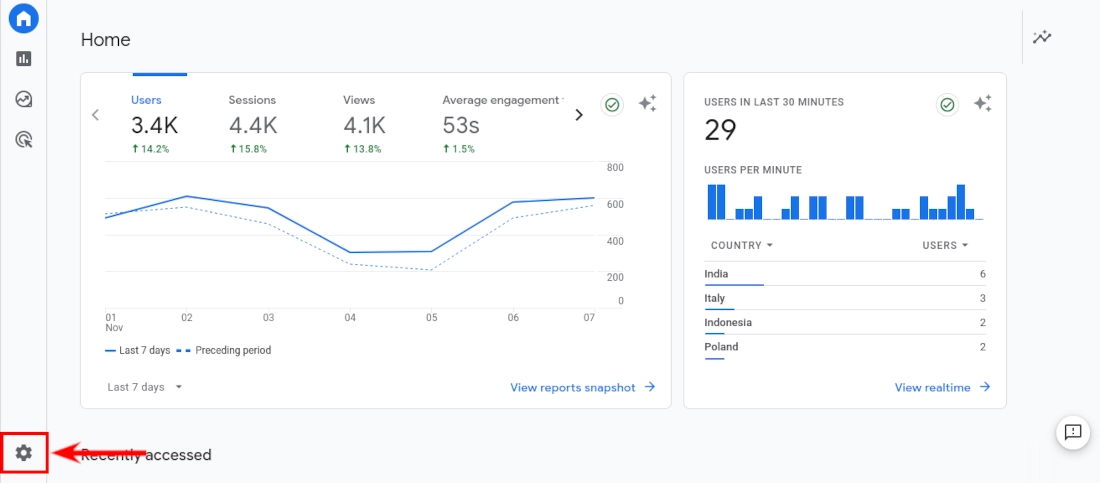
Step 4: Navigate to Access Management
Depending on what level you want to add the new user, i.e. the Account or Property level, click on "Account Access Management" or "Property Access Management" under the Account settings and Property settings section respectively.
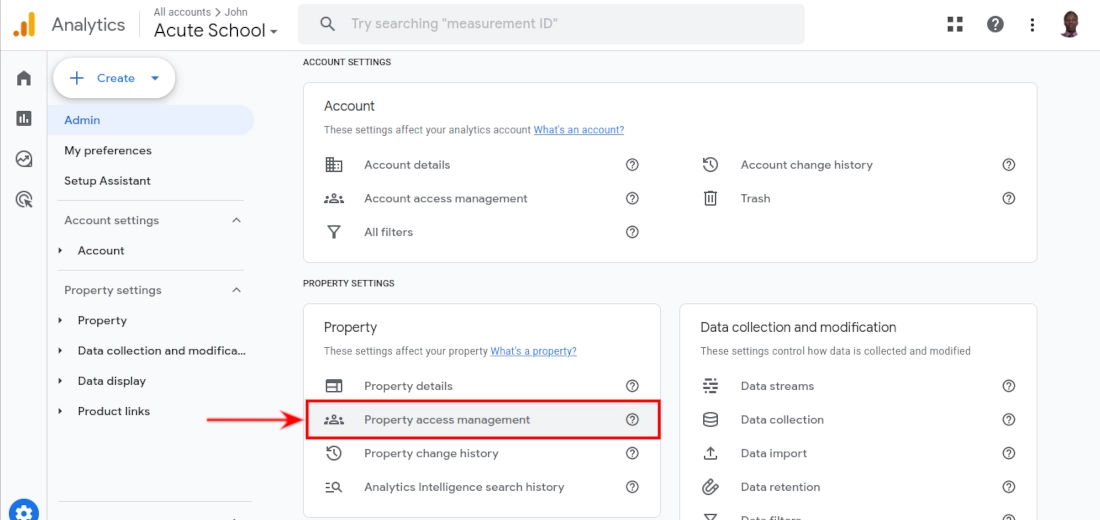
This will open the user management settings for the selected account or property.
Step 5: Add New User
Click on the plus (+) icon button at the top-right corner. Then click on the "Add Users" option.

Step 6: Enter the User Details
You will be prompted to enter the email address of the user you want to add. Once you have entered it, select the appropriate role for the new user depending on the level of access that aligns with the user's role and responsibilities.
You may also check the "No Cost Metrics" and "No Revenue Metrics" checkboxes if you want to limit the user from accessing the cost and revenue-related metrics.
There will also be a "Send notification" checkbox which is checked by default. The user will receive a notification in their email with instructions on how to access Google Analytics once added. Leave it as it is or may choose to uncheck it if you don't want the user to receive the email notification.
Then click on the "Add" button at the top-right.
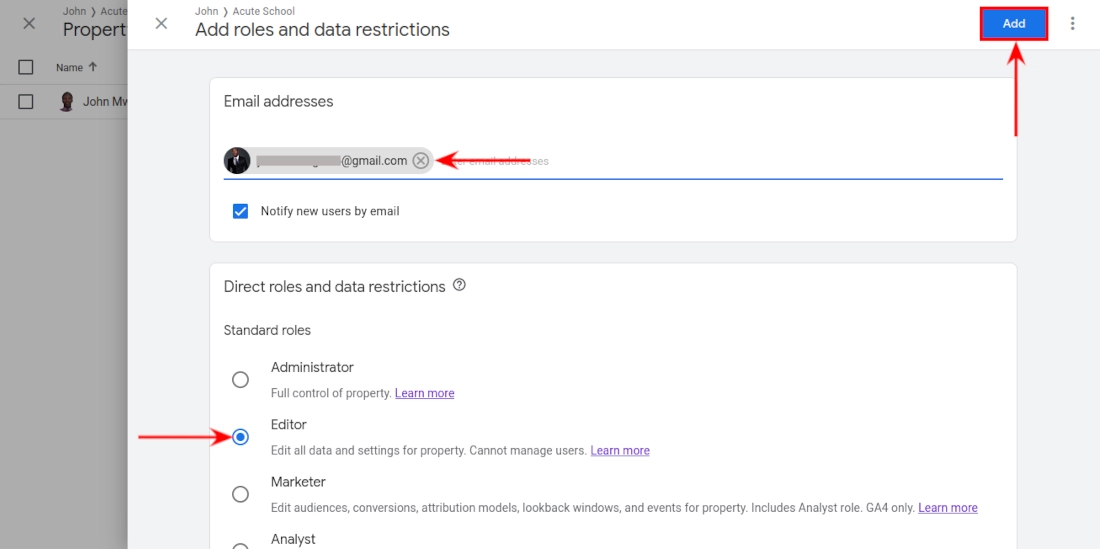
Once successfully added, you will see the user details under the account/property access management table. The user will now have access to the specified account or property according to the permissions you've assigned.

Managing Users in Google Analytics 4
Managing users in Google Analytics includes the ability to change their roles or remove their access to the account or property when it's no longer needed.
To access the user management section in your Google Analytics 4 account, navigate to the Admin section and select the relevant account and/or property, then click on "Account Access Management" under the Account column or "Property Access Management" under the Property column.
The option you choose depends on what level you added the user, i.e. at the account or property level.
Click on the 3 dots icon at the right column of the user record.

To remove the user's access to the property or account, click on the "Remove access" option. You will be prompted to confirm the action. Click on the "Remove" button to confirm the removal.
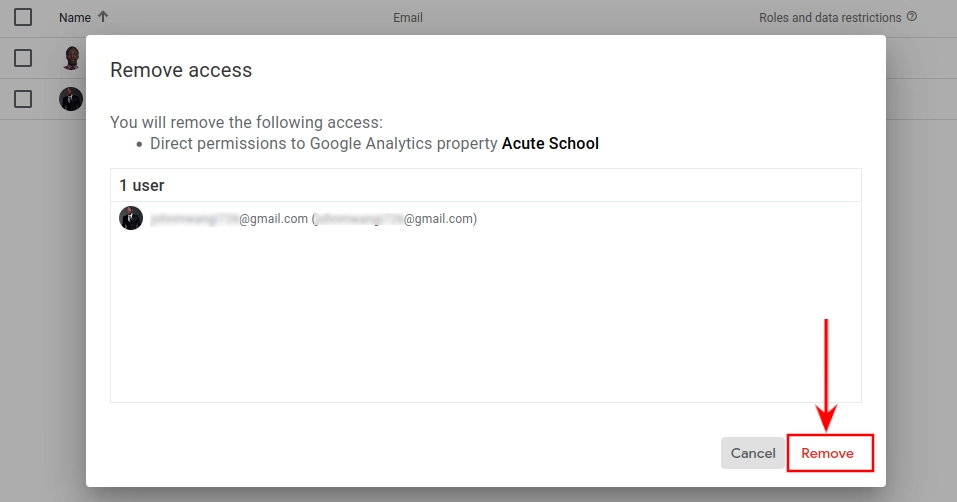
To change the user's role, click on the "View user's account details" option. Then click on the account to expand the details.

You will see a list of the properties in the account with the roles to which the selected user is assigned for each property. Click on the role or on the pencil icon on a property record to change the role for the user in it.
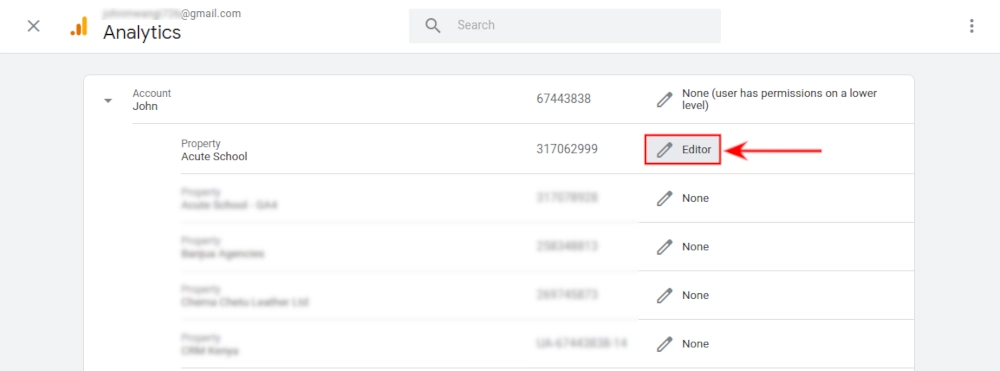
Select the new role that you want to assign the user on the property and then click on the "Save" button at the top-right corner.
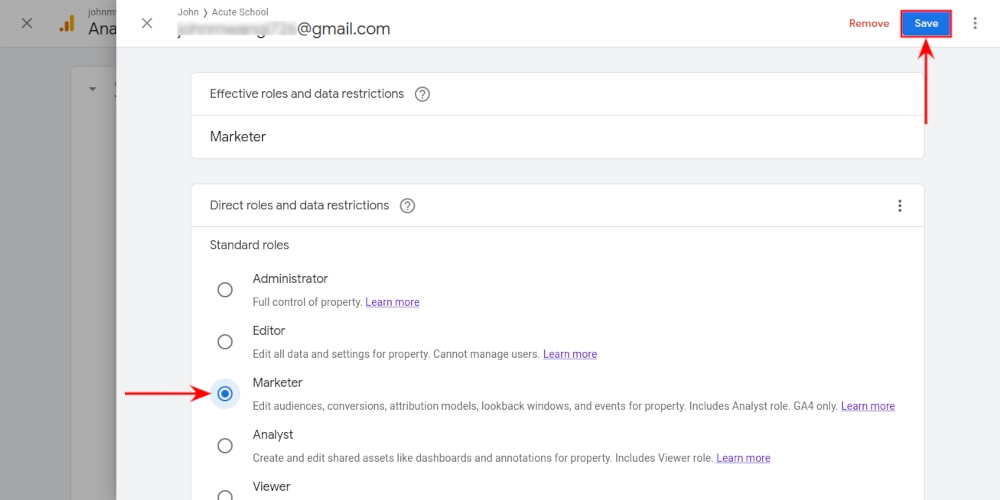
That's it! When the user logs in to their Google Analytics account, their access will be limited to the new role.
In Conclusion
Managing users in Google Analytics is essential for collaboration, data security, and efficiency. Understanding the types of users and their privileges is crucial in ensuring that each team member has the appropriate level of access.
Adding and removing users in Google Analytics 4 is a simple process that allows you to control who can analyze your website data and make changes to your account or property settings.
By following the steps outlined in this article, you can easily manage your Google Analytics users and ensure that the right people have access to your data.
